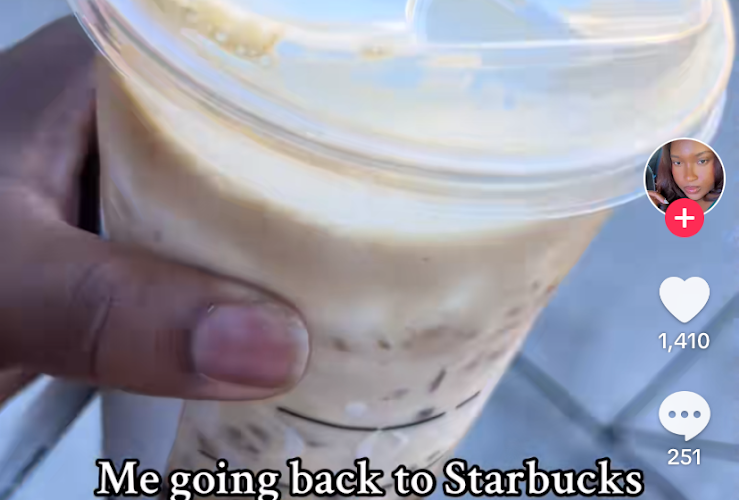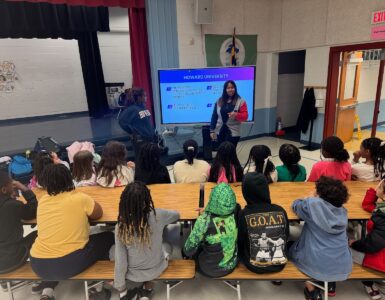A post from TikTok creator @weirdkidsammy. (Courtesy/Tait Manning).
Some Kamala Harris supporters have abandoned boycotts against McDonald’s and Starbucks in retaliation against Palestinians, who they say are to blame for the vice president’s loss.
These boycotts gained traction after the Hamas attack of Oct. 7, 2023, when global consumers began protesting the companies’ apparent support of Israel.
How are Starbucks and McDonald’s affiliated with Israel?
Although neither McDonald’s nor Starbucks are on the official boycott list created by the Palestinian-led Boycott, Divestment, and Sanctions (BDS) movement, many pro-Palestine advocates were angered by their complicity in Israel’s assault on Gaza.
It is worth noting that Starbucks has also received heavy criticism for its anti-union practices and its 2020 ban on employees wearing Black Lives Matter apparel.
In 2023, Starbucks attacked the union Starbucks Workers United after a member posted a tweet expressing solidarity with Palestinians. The company accused the union of showing “support for violence perpetrated by Hamas.”
Additionally, in a controversial move, McDonald’s Israeli franchise provided free meals to the Israeli military following Oct. 7. The company has since bought back all of its restaurants in Israel, according to Reuters.
What is inspiring people to break the boycott?
Supporters of BDS in Berlin, Germany in 2019. (Courtesy/Britannica)
A trend of denouncing the Starbucks and McDonald’s boycotts surfaced shortly after the Nov. 5 election. Some Black TikTok users said they refused to stand in solidarity with Palestinians, as Palestinians did not stand in solidarity with them during the election.
One TikTok user, @jusnene, posted two-minute-long videos about the issue.
In one video, she encouraged Black people to return to Starbucks. She said this was in response to a video by a Palestinian woman urging Americans to vote for Jill Stein or Donald Trump, adding that anyone who voted for Harris would not be accepted into her community.
In another video, she said: “I’m no longer fighting for people who are actively against me and my needs and what I need for my people… I’m not with nobody that voted against my safety and bodily autonomy.”
She then went on to say that Palestinians helped put Trump in office, and that “Black people here need to focus on Black people and people who look like us.”
Other Black women shared similar sentiments on social media.
Another TikTok creator, @curatedbydrew, shared a post that read, “POV: joining black women as we drink our Starbucks and mind our business for these next four years and beyond”
A post from TikTok creator @curatedbydrew. (Courtesy/Tait Manning)
Another creator, @theweaveponzel, posted text reading “POV: enjoying Starbucks again bc I’m done boycotting it for people who literally hate me.”
This trend misdirects frustration over the election and onto Palestinians and overlooks a long history of solidarity between Palestinians and Black Americans. It also ignores the existence of Afro-Palestinians, who face double discrimination.
A Brief History of Palestinian-African American Ties
In 1964, Malcolm X became one of the first African American activists to meet with the Palestine Liberation Organization (PLO).
Then, when Israel conquered the West Bank and Gaza in 1967, many in the Black Power Movement began to draw parallels between Israel’s illegal seizure of Palestinian lands, U.S. imperialism in Vietnam and the oppression of Black Americans.
The Student Nonviolent Coordinating Committee (SNCC) published a statement that year expressing solidarity with Palestine and recognizing Israel as a settler colonial project, comparable to that of the United States, calling it “the tool and foot-hold for American and British exploitation in the Middle East and Africa.”
Additionally, the Black Panther Party (BPP) embraced the Palestinian cause as part of their struggle. Party member Edgar Cleavers developed relationships with Palestinians in PLO.
Later, in the 1970s, BPP leader Huey P. Newton asserted, “We support the Palestinians’ just struggle for liberation one hundred percent. We will go on doing this, and we would like for all the progressive people of the world to join our ranks in order to make a world in which all people can live.”
Arab-American activists also built connections within Black-American movements. Kwame Ture –also known as Stokley Carmichael–even spoke at the 1968 national convention of the Organization of Arab Students, and the Association of Arab-American University Graduates lobbied for Shirley Chisolm in her 1972 bid for the presidency.
Jesse Jackson with former Palestinian political leader Yasser Afarat in Beirut, Lebanon, in 1979 (Courtesy/Associated Press)
During the Black Lives Matter protests of 2020, several murals of George Floyd were painted in Gaza and the West Bank, and BDS released a statement voicing their solidarity with the Black Lives Matter Movement.
A Mural of George Floyd in Gaza City, painted after his murder at the hands of Minneapolis police in 2020. (Courtesy/NPR)
A mural of George Floyd in the occupied West Bank. (Courtesy/Getty Images)
Protesters waving a Palestinian flag and chanting “Black Lives Matter” at a protest in Cleveland in 2016. (Courtesy/Reuters)
This history must be remembered, as it is a reminder that transactional solidarity is not always the best practice, especially as Palestinians endure ongoing displacement and military violence.
The connection between African Americans and Palestinians goes beyond November’s election. It is misguided and dangerous to blame Palestinians for the loss of the Democratic party. As they struggle under occupation and a desperate humanitarian crisis, we must recognize that our struggles are aligned, and now is not the time to turn away.










Recent Comments